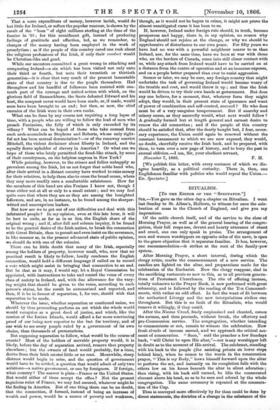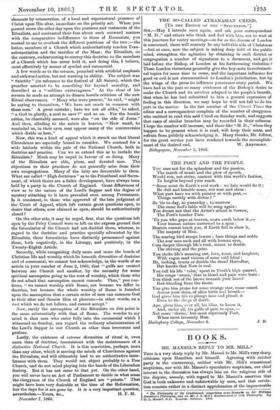RITU ALISM.
[TO THE EDITOR OF THE "SPECTATOR."]
S,—You gave us the other day a chapter on Ritualism. I went last Sunday to St. Alban's, Holborn, to witness for once the cele- bration of mass in the Church of England, and give you my impressions.
Of the noble church itself, and of the service to the close of Morning Prayer, as well as of the general bearing of the congre- gation, their full response, devout and hearty utterance of chant and creed, one can only speak in praise. The arrangement of men and women worshippers on opposite sides of the nave, is open to the grave objection that it separates families. It has, however, one recommendation—it strikes at the root of the family-pew system.
After Morning Prayer, a short interval, during which the clergy retire, marks the commencement of a new service. The candles are lighted on the altar, and preparations made for the celebration of the Eucharist. Now the clergy reappear, clad in the sacrificing vestments so new to this, as to all previous genera- tions of Protestant Churchmen. The rite of offering incense, totally unknown to the Prayer Book, is now performed with great solemnity, and is followed by the reading of the Ten Command- ments, with rather an odd effect. In fact the want of fit between the authorized Liturgy and the new interpolations strikes one throughout. But this is no fault of the Ritualists, who would remove it willingly, if they could.
After the Nicene Creed, finely emphasized and chanted, comes the sermon, and then proceeds, without break, the offertory and pre-Communion service. The congregation, whether intending to communicate or not, remain to witness the celebration. Now fresh clouds of incense ascend, and we approach the critical mo- ment of consecration. "Soon," said the preacher a few Sundays back, "will Christ be upon His altar,"—nor is any worshipper left in doubt as to the moment of His arrival. The celebrant, standing with his back to the people (the assisting priests on lower steps behind him), when he comes to the words in the consecration prayer, "This is my Body," bows himself forward upon the altar to perform the act, and instantly on its completion falls with the others low on his knees beneath the altar in silent adoration ; then rising, with his back still turned, he lifts the consecrated element above his head, so as to be seen and adored by the whole congregation. The same ceremony is repeated at the consecra- tion of the Cup.
Thus is conveyed more effectively by far than could be done by direct statements, the doctrine of a change in the substance of the
elements by consecration, of a local and supernatural presence of Christ upon His altar, immediate on the priestly act. When you poured scorn the other day upon the postures and vestments of the Ritualists, and contrasted their fuss about such outward matters with the comparative indifference to them of Romanists, you seemed to me to overlook the different positions of the two ;—the latter, members of a Church which authoritatively teaches Tran- substantiation and the sacrifice of the Mass ; the Ritualists, on the contrary, endeavouring to convey this doctrine to the members of a Church which has never held it, and doing this, I believe, most effectively by means of symbol and ceremonial.
A few words as to the sermon, preached with artificial emphasis and awkward action, but not wanting in ability. The subject was " Sanctity " (in reference to the festival of All Saints), which the preacher asserted to be something far beyond morality, and described as a "sublime extravagance." At the close of his sermon he made an attempt to disarm hostile criticism of the new Ritual observances. "Many who were present," he said, "might be saying to themselves, We have not much in common with these men.' A great mistake ; have we not all alike," he asked, " a God to glorify, a soul to save ?" and so on. For the hostile critics, he charitably assumed, were also "on the side of Jesus."
And then, alluding to the saints in heaven, "How small, he reminded us, in their eyes, may appear many of the controversies which divide us here."
Now, this was a kind of appeal which it struck me that liberal Churchmen are especially bound to consider. We contend for a wide latitude within the pale of the National Church, both in doctrine and practice. Can we so extend this as to include the Ritualists? Much may be urged in favour of so doing. Many of the Ritualists are able, pious, and devoted men. The objections to their Practices do not generally arise from their own congregations. Many of the laity are favourable to them.
What are called "High doctrines " as to the Priesthood and Sacra- ment, of which theirs are a fuller development, have always been held by a party in the Church of England. Great differences of view as to the nature of the Lord's Supper and the degree of mystery attaching to it have prevailed even among Protestants. Is it consistent, in those who approved of the late judgment of
the Court of Appeal, which left certain great questions open, to desire that others, now claimed as open, should be authoritatively. closed?
On the other aide, it may be urged, first, that the questions left open by the Privy Council Were so left on the express ground that
the formularies of the Church had not decided them, whereas, in regard to the doctrine and practice specially advocated by the Ritualists, those formularies have distinctly pronounced against them, both negatively, in the Liturgy, and positively, in the Twenty-Eighth Article.
Secondly, while recognizing daily more and more the bonds of Christian life and worship which lie beneath diversities of doctrine and of ceremonial, we cannot but acknowledge, in the words of an article in your number of June 2, 1866, that "gulfs are created between one Church and another, by the necessity for some spiritual assumption going to the root of worship, which those who do not admit that assumption cannot concede. Thus," you con- tinue, "we cannot worship with Rome, not because we differ in doctrine, but because the whole worship of Rome is founded
upon the assumption that a certain order of men can summon God to their altar and dismiss Him at pleasure—in other words, on a tact which we do not believe, and cannot accept."
Now, surely the assumption of the Ritualists on this point is the same substantially with that of Rome. The wonder to my mind is that men who enter fully into the ceremonial which I witnessed on Sunday, can regard the ordinary administration of the Lord's Supper in our Church as other than irreverent and profane.
Lastly, the existence of extreme diversities of ritual is, even more than of doctrine, inconsistent with the maintenance of a distinctive National Church. It is this conviction, perhaps, more
than any other, which is moving the minds of Churchmen against the Ritualists, and will ultimately lead to an authoritative inter- ference with them. They would not object probably to a Free Church, and do not mind playing into the hands of the Liberation Society. But it has not come to that yet. On the other hand, you will never have an Act of Parliament to decide in what sense the clergymen of the Church of England are "priests." That might have been very desirable at the time of the Reformation, but the days for it are gone by. It is a very important question,































 Previous page
Previous page